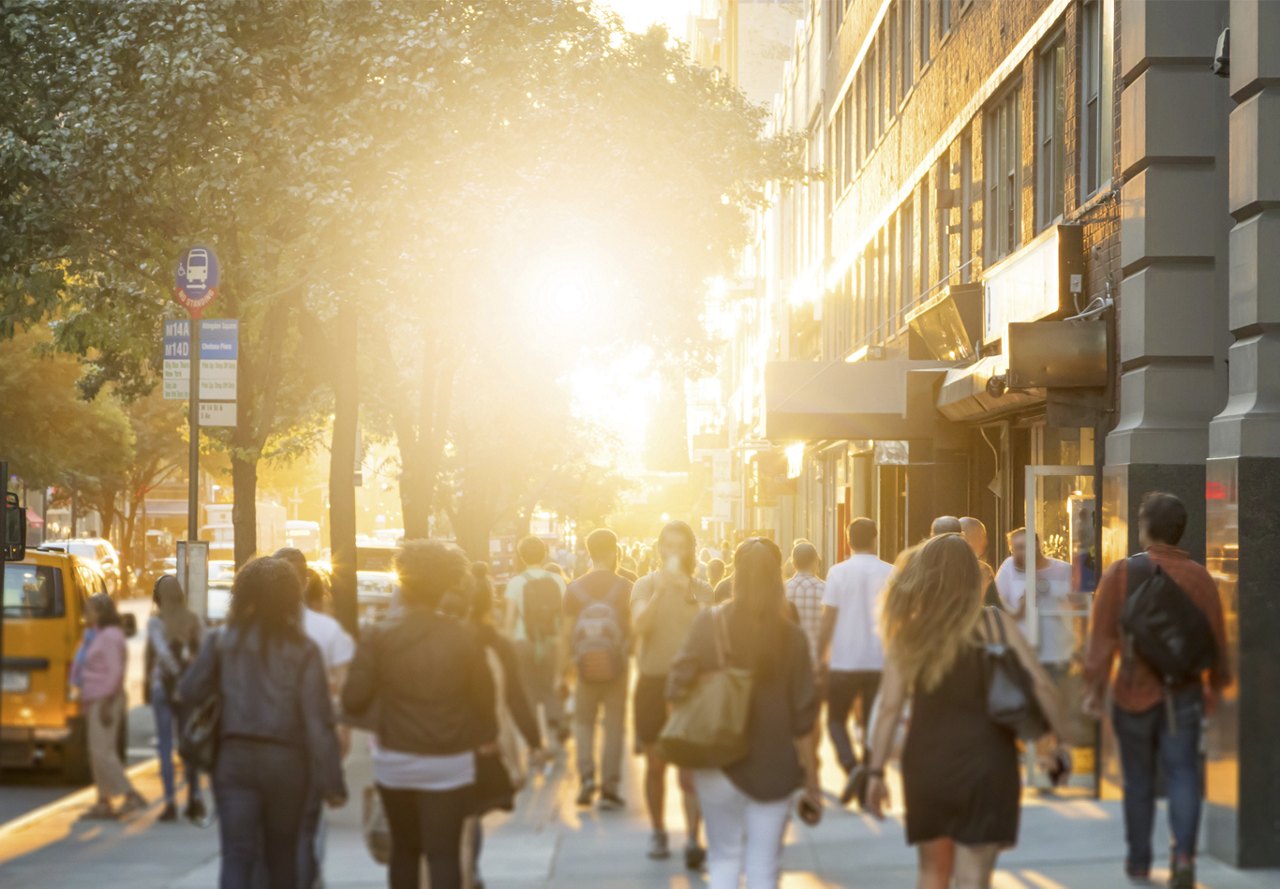15 Questions to Ask Yourself When Apartment Hunting
There’s no question: finding the right apartment takes work. Though apartment hunting may seem daunting, the more thought you put in prior to actually researching and touring, the easier it will be to narrow down your search. Before you start browsing the thousands of apartments near you, take some time to really think about what it is you’re looking for.
What are your priorities? Amenities? Location? Price?
With so many factors and features to consider, pinning down exactly what you’re looking for is easy if you know the right questions to ask. To help you figure out what you need and find a space that meets your expectations, here are the most important questions to ask yourself in the early stages of your apartment search:
- What is my price range?
- Where do I want to live?
- What neighborhoods are of interest to me?
- What local amenities do I need nearby?
- What is the ideal vibe of my community?
- How much space do I need?
- What are my “must-haves” versus “nice-to-haves?”
- What style of apartment am I looking for?
- What utilities and services do I need included?
- How long of a lease am I interested in?
- What building policies do I require?
- What do I need to apply?
- What are my rights and responsibilities?
- What is the reputation of the property?
- Are there any hidden costs or fees I should expect?
Before You Begin Apartment Hunting, Ask Yourself…
What is My Budget?
Setting a realistic budget before you begin your search is crucial. It’s essential to know how much you can afford to spend on rent each month without compromising your financial stability. Your budget should take into account not just the monthly rent but also other living expenses, including:
- Utilities: Electricity, water, gas, internet, and cable can significantly add to your monthly expenses.
- Deposits: Initial costs such as security deposits, first and last month’s rent and possibly a pet deposit.
- Other living expenses: Groceries, transportation, gas, insurance, other recurring monthly payments, and personal savings.
By understanding your total monthly income minus your total monthly expenses, you can avoid spreading your finances too thin and ensure that your new apartment does not become a source of financial stress.
What Location Suits My Lifestyle?
Choosing the right location can greatly impact your daily life and overall satisfaction with your living situation. Consider the following factors when evaluating different neighborhoods:- Proximity to work or school: Shorter commutes save time and reduce transportation costs. Look for areas that are within a reasonable distance from your workplace or educational institution.
- Access to public transportation: If you rely on public transit, check the availability and convenience of bus or train lines. Consider the frequency and reliability of services.
- Neighborhood safety: Research crime rates and safety records of potential neighborhoods. Visit the area at different times of the day to get a sense of security.
- Amenities: Think about what you want nearby. Parks, grocery stores, restaurants, and entertainment options can enhance your quality of life. Make a list of must-have amenities and see how each neighborhood stacks up.
What is My Ideal Neighborhood?
While the general location of your building is important, pinpointing an exact neighborhood or street can make a big difference. Here are a few things to consider:- Crime rates and safety: When choosing where to live, safety is a top priority. Research crime rates in potential areas using online resources or local police department reports. Visit the neighborhood at different times of the day to gauge the overall safety and comfort level. And don’t be afraid to ask around – locals know best!
- Busy or quiet: Determine whether you prefer a bustling, city-like atmosphere or a quieter, more serene environment. Busy neighborhoods may offer more amenities and nightlife, but they tend to be noisier. Quieter areas might provide a more relaxed atmosphere but could lack certain conveniences.
- Historic versus modern architecture: Do you prefer the charm of a historic neighborhood with unique architecture and character, or a modern area with new developments and contemporary conveniences? Historic areas may have more stringent building regulations, while modern neighborhoods might offer more up-to-date infrastructure and amenities.
- Walkability: Evaluate your preference for walkability versus the necessity of driving. Walkable neighborhoods typically have everything you need within a short distance, while drivable areas may require a car for most errands.
- Parking availability and costs: For those who own a car, consider the availability and cost of parking. Some apartments offer designated parking spaces or garages, while others may rely on street parking, which can be competitive and potentially costly.
What Local Amenities Do I Want Nearby?
When browsing a neighborhood, the availability of nearby amenities can significantly impact your life. Consider the following aspects to ensure your daily needs and lifestyle preferences are met.- Proximity to grocery stores, restaurants, and healthcare: Living near essential services like grocery stores, restaurants and healthcare facilities adds convenience to your daily life. Make a list of must-have amenities and check their availability in the neighborhoods you are considering.
- Availability of recreational areas: Access to recreational areas such as parks and fitness centers is important for maintaining an active and balanced lifestyle. Look for neighborhoods that offer green spaces and outdoor fitness facilities if this is a priority for you.
What Type of Community Am I Hoping For?
The community you choose can greatly influence your sense of belonging and overall satisfaction with your living situation. Here are a few things to consider to help you find a neighborhood that matches your social and lifestyle needs:- Demographics: Think about the type of community you want to be part of. Research the demographics of potential neighborhoods to find areas with a population that aligns with your lifestyle, whether it’s families, young professionals or students.
- Community events: A neighborhood or complex that offers community events and social opportunities can make your living experience all that much more special. If connecting with those in your community is important to you, look for properties or neighborhoods that offer social events, local clubs and volunteer opportunities.
What Size Apartment Do I Need?
The size and layout of the apartment you need will depend on your personal circumstances and lifestyle. To find an apartment that’s “just right,” you’ll need to think about the following:- Number of bedrooms and bathrooms: Determine how many bedrooms and bathrooms you need based on whether you live alone, with a partner, family, or roommates.
- Square footage: Think about how much space you need to live comfortably with your belongings and roommates or family. More square footage often means higher rent, so find a balance between space and affordability.
What Amenities Are Essential?
Identifying your “must-haves” versus “nice-to-haves” is crucial to finding an apartment that fits your lifestyle. Here are some amenities to consider:- In-Unit Laundry: Having a washer and dryer in your apartment adds convenience and saves time.
- Dishwasher: A dishwasher can be a huge time-saver, especially if you cook often.
- Parking: If you own a car, secure parking is critical. Check if the apartment offers dedicated parking spaces and the monthly cost.
- Gym: An on-site gym can save you money on pricey gym memberships and make it easier to maintain a fitness routine.
- Pool: A swimming pool is a nice perk, especially in warmer climates, but it can also increase rent costs.
- Pet-friendliness: If you have pets, ensure the apartment allows them and check for any additional fees or pet-specific amenities like dog parks.
When evaluating these amenities, weigh their importance against your budget. Some amenities may be nice to have but not worth the extra cost if they strain your finances. Prioritize what truly enhances your living experience and fits within your budget.
What Style of Apartment Am I Interested In?
When it comes to selecting an apartment, style matters. The aesthetic and functional design of your living space can greatly impact your comfort and satisfaction. Consider the following styles:- Modern/Contemporary: These apartments often feature sleek lines, minimalistic designs, and state-of-the-art appliances. They are typically found in newer buildings and appeal to those who prefer a clean, up-to-date look.
- Lofted: Loft apartments usually have high ceilings, open floor plans, and large windows. Often converted from industrial buildings, lofts offer a unique blend of raw and refined elements, ideal for those who appreciate an airy, spacious feel.
- Historic: Historic apartments are located in older buildings that may have unique architectural details, such as crown molding, original hardwood floors, and vintage fixtures. These spaces often come with a lot of character and charm, suitable for those who appreciate a more classic or eclectic style.
- Trendy: Trendy apartments are often located in up-and-coming neighborhoods and feature stylish interiors, creative layouts, and access to the latest hotspots. These are perfect for those who enjoy being at the heart of a vibrant, dynamic community.
What Kind of Utilities and Services Do I Need?
The utilities and services available in an apartment can significantly affect your convenience and overall living experience. Make sure to consider the following:- Basic utilities: Ensure essential utilities like water, gas, and electricity are included or understand how they are billed. Some apartments bundle these costs into the rent, while others require separate payments.
- Internet and cable: High-speed internet is a necessity for most people today, whether for work, streaming, or staying connected. Check the availability of reliable internet and cable services in the apartment.
- Maintenance and repairs: Reliable maintenance services are crucial. Understand how maintenance requests are handled and the typical response time for repairs.
- Security: Consider the security measures in place, such as secure entry systems, security cameras, and on-site security personnel. Feeling safe in your home is paramount.
What is My Ideal Lease Term?
The duration of your lease is an important consideration in apartment hunting, as it dictates your commitment to living in that space. Consider the following aspects:- Typical lease lengths: Most leases are a 1-year commitment, but some landlords may offer shorter or longer terms. Assess your stability and future plans to decide what length is best for you.
Note: Opt for a short-term lease (e.g. 6 months) may increase your monthly rent in some circumstances.
- Penalties for breaking a lease: Familiarize yourself with the consequences of terminating your lease early. Penalties can include losing your deposit, paying additional fees, or being responsible for rent until a new tenant is found. While the penalties may vary by landlord or property, you should at least understand the price of your commitment in a general sense.
What Kind of Building Policies Are Important to Me?
Building policies can greatly influence your day-to-day living experience. Make sure you are comfortable with the rules and regulations set by building management:
- Pet policies: If you have or plan to get pets, be sure to ask about the pet policy. Some buildings may have restrictions on the type, size or number of pets allowed and may require additional deposits or pet rent.
- Noise regulations: This is especially important if you work from home, have young children or are sensitive to noise. Policies might include quiet hours or restrictions on loud activities. If a quiet living space is important to you, be sure to take this into consideration.
- Guest policies: If you enjoy hosting friends and family, finding a space that offers accommodating guest policies is a must. Some properties may have strict regulations on how long guests can stay or require guest registration.
Now That You’ve Started Touring, You Should Inquire About…
What Will I Need for the Application Process?
Though applying may be jumping a few steps ahead, it’s important to consider what you’ll need when the time comes. In many situations, apartments can go quickly! If you’re not prepared to apply once you’ve found a place you love, you could miss out. Here’s what you’ll likely need to get started:- Required documents (ID, Proof of Income, References): Prepare the necessary documents for the application process, including identification, proof of income and references. Landlords typically require these to assess your eligibility and reliability as a tenant.
- Application fees and deposits: Be aware of any application fees and deposits required when applying for an apartment. These can include a non-refundable application fee, security deposit and potentially a pet deposit if applicable.
What Are My Rights and Responsibilities as a Tenant?
While these will vary by property, understanding your responsibilities can help you determine if an apartment is right for you. Plus, you’ll be a bit more prepared for what you’re “signing up for.” Here are a few things to brief yourself on as you tour apartments:- Local tenant laws and regulations: Familiarize yourself with local tenant laws and regulations to understand your rights and responsibilities. This includes knowing the terms of your lease, eviction policies and procedures for resolving disputes with your landlord.
- Responsibilities regarding maintenance, utilities and rent payments: Understand your responsibilities, including maintaining the property, paying utilities, and ensuring timely rent payments. Knowing these obligations can help prevent misunderstandings and legal issues.
What is the Property’s Reputation?
As you browse online, be sure to check out the reviews for each property to avoid surprises. Here are a few things to look into:- Online reviews and feedback from current or past tenants: Investigate the property manager’s reputation by reading reviews and seeking feedback from previous tenants. This can give you insights into their responsiveness, reliability, and overall management style.
- Responsiveness and reliability in handling maintenance requests or security issues: Your happiness and safety should be a top priority. Making sure your future property manager will address any maintenance requests, repairs, or security issues in a timely and aggressive manner is critical. A responsive property manager can significantly enhance your living experience by ensuring issues are resolved quickly.
Are There Any Hidden Costs?
As you start to seriously consider applying for an apartment, be sure that you do your research to avoid any surprises like hidden feeds. Here are the big items to ask about:- Move-in fees, pet deposits and parking fees: Be aware of any costs, such as move-in fees, pet deposits and parking expenses. These can add up and impact your budget.
- Utility setup fees, renter’s insurance, and other unforeseen expenses: Factor in utility setup fees, renter’s insurance, and other potential costs. Understanding these financial obligations upfront can help you budget more accurately.
Find an Apartment With Everything You Need to Live Easy
At Greystar, we get it – you want a place that works for you. That’s why, when it comes to apartment hunting, we understand the importance of getting all your questions answered.
To find an apartment that meets all your expectations and living needs, start your search with us.
The information presented on or through this Website is made available solely for general information purposes. We do not warrant the accuracy, completeness, or usefulness of this information. Any reliance you place on such information is strictly at your own risk. We disclaim all liability and responsibility arising from any reliance placed on such materials by you or any other visitor to this Website, or by anyone who may be informed of any of its contents. Any reference to amenities, services, rules, policies, or procedures at a Greystar apartment community is general in nature, and each Greystar apartment community may have amenities, services, rules, policies, and procedures that differ from those referenced on this Website. Please consult with your Greystar apartment community for the exact amenities, services, rules, policies, or procedures applicable.
This Website may include content provided by third parties, including materials provided by other users, bloggers, and third-party licensors, syndicators, aggregators, and/or reporting services. All statements and/or opinions expressed in these materials, and all articles and responses to questions and other content, other than the content provided by Greystar, are solely the opinions and the responsibility of the person or entity providing those materials. These materials do not necessarily reflect the opinion of Greystar. We are not responsible, or liable to you or any third party, for the content or accuracy of any materials provided by any third parties.











